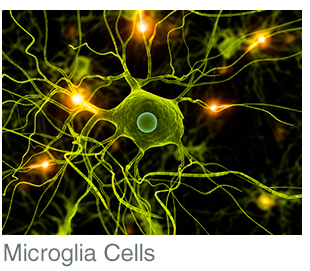Two research teams from the Weizmann Institute and Michael Sieweke's group joined forces to publish a study this week in Science, pointing among other things, to the central role of transcription factor MafB on the final maturation steps of microglia, the principal immune cells present in the brain and contributing to its development and maintenance.
 Disrupted fetal immune system development, such as that caused by viral infection in the mother, may be a key factor in the later appearance of certain neurodevelopmental disorders such as autism or schizophrenia. This finding emerges from a study by the Ido Amit and Michal Schwartz labs from the Weizmann Institute and by the Michael Sieweke’ lab from CIML, published in the journal Science on August 19th.
Disrupted fetal immune system development, such as that caused by viral infection in the mother, may be a key factor in the later appearance of certain neurodevelopmental disorders such as autism or schizophrenia. This finding emerges from a study by the Ido Amit and Michal Schwartz labs from the Weizmann Institute and by the Michael Sieweke’ lab from CIML, published in the journal Science on August 19th.
Following the different phases of microglia development by monitoring temporal gene expression profiles
By studying the principal immune cells present in the brain – the microglia, which contribute to the brain’s development and maintenance, the scientists discovered that the development of these cells in the mouse fetus and in newborn mice proceeds in three distinct stages, parallel to those of the developing brain: early cells that populate the brain of the embryo shortly after its inception, pre-microglia and adult cells. By screening the genomes of these cells and testing them extensively, they were able to define each stage in terms of its activated genes, their control genetics mechanisms.
The second stage – that of the pre-microglia – proved the most sensitive to disruptions
This stage takes place close to birth and shortly afterwards, just when the developing brain undergoes the vital process of “pruning,” in which inappropriate synapses among neurons are lopped off by microglia. When the scientists exposed the brains of pregnant mice to synthetic materials that mimic a viral infection such as CMV, they found that the development of the pre-microglia was disrupted in their offspring. Genes involved in the maturation of these cells were expressed at the wrong time, and the cells proceeded to an adult stage earlier than usual. The treatment leads to abnormal behavior, including disturbances in social interaction and behaviors similar to those of people with schizophrenia.
MafB expression is induced in the transition from pre- to adult microglia
Transcription factors that play important roles in regulating gene expression of a cell are not expressed to the same extend during the different microglia developmental phases. While several regulators begin to be expressed in the pre-microglia stage, several others including MafB are specific to the adulthood stage and are therefore likely to be involved in establishing microglia homeostatic functions or in terminating developmental functions of pre-microglia.
To address the functional role of MafB in microglia development, the Michael Sieweke lab, joint senior author of the study, generated genetically modified mice that exhibit loss of the transcription factor in this specific tissue. Microglia from newborn (pre-microglia) and adult mice were collected and compared to control mice of the same age. "The results of this study confirm the functional importance of MafB in regulating adult microglia homeostasis. Its manipulation might therefore hold promise for affecting several neurodevelopmental disorders including autism and schizophrenia " concludes Micheal Sieweke.
Further work on MafB and identification of other signals and factors that contribute to microglia transitions and homeostasis will allow scientists to better understand the crosstalk between microglia and the central nervous system in both normal development and pathology.
Source : Microglia development follows a stepwise program to regulate brain homeostasis
Authors: Orit Matcovitch-Natan, Deborah R. Winter, Amir Giladi, Stephanie Vargas Aguilar, Amit Spinrad, Sandrine Sarrazin, Hila Ben-Yehuda, Eyal David, Fabiola Zelada Gonzalez, Pierre Perrin, Hadas Keren-Shaul, Meital Gury, David Lara-Astaiso, Christoph A. Thaiss, Merav Cohen, Keren Bahar Halpern, Kuti Baruch, Aleksandra Deczkowska, Erika Lorenzo-Vivas, Shalev Itzkovitz, Eran Elinav, Michael H. Sieweke, Michal Schwartz, Ido Amit